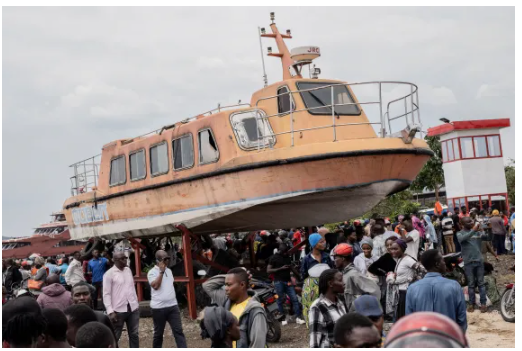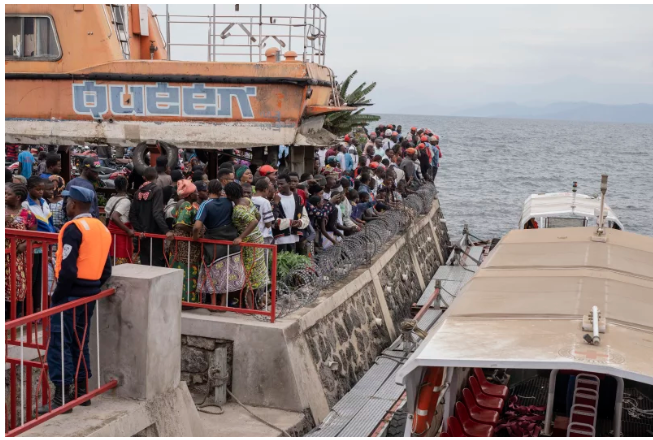 Kinshasa, Democratic Republic of Congo (DRC) A devastating tragedy unfolded in the Democratic Republic of Congo (DRC) after a boat carrying passengers and goods capsized in the Congo River, leading to the deaths of at least 78 people. The incident, which occurred late Tuesday night, has left many grieving families and underscores the severe safety issues surrounding water transport in the region.
Kinshasa, Democratic Republic of Congo (DRC) A devastating tragedy unfolded in the Democratic Republic of Congo (DRC) after a boat carrying passengers and goods capsized in the Congo River, leading to the deaths of at least 78 people. The incident, which occurred late Tuesday night, has left many grieving families and underscores the severe safety issues surrounding water transport in the region.
According to local authorities, the overloaded boat was navigating the Congo River near the city of Mbandaka, in the northwestern part of the country. The vessel, which was carrying a mixture of passengers and cargo, capsized under what is believed to have been adverse weather conditions combined with overcrowding. Survivors report that the boat was packed beyond its capacity, with passengers sitting on top of cargo, a common but dangerous practice in many parts of the DRC where transportation options are limited.
We were in the middle of the river when the boat started swaying violently, recounted one survivor. People were screaming, and within minutes, it flipped. I was lucky to grab a piece of wood and hang on.
Rescue teams were immediately deployed to search for survivors. However, the remote location and darkness significantly hampered efforts. As of Thursday, rescue teams, assisted by local fishermen, have recovered 78 bodies, but the number is expected to rise as many passengers remain unaccounted for. Authorities have yet to release a full count of how many people were onboard at the time of the accident, but estimates suggest that the number could be well over 100.
With limited emergency response infrastructure in the region, the recovery efforts have largely been community-driven, with locals assisting the overwhelmed rescue teams. It’s heartbreaking, said a local resident. Families are still looking for their loved ones, hoping for a miracle, but time is running out.
Boat accidents are tragically common in the DRC due to several factors, including overcrowding, poor maintenance of vessels, and lack of safety regulations. Many boats operating on the country’s rivers are outdated and not equipped with basic safety equipment such as life jackets. Overloading is a frequent issue, as economic pressures lead operators to pack their vessels with as many passengers and goods as possible to maximize profits.
The situation is desperate, said a transport official in Mbandaka. Boats are often the only means of transportation for people in these remote regions, but they are not safe. This is not the first time we’ve lost lives in such a horrific manner, and unless things change, it won’t be the last.
 The DRC’s vast network of rivers, including the Congo River, serves as a major transportation route, particularly in areas that are inaccessible by road. However, the lack of regulatory oversight has turned these waterways into dangerous routes for those who rely on them.
The DRC’s vast network of rivers, including the Congo River, serves as a major transportation route, particularly in areas that are inaccessible by road. However, the lack of regulatory oversight has turned these waterways into dangerous routes for those who rely on them.
Following the disaster, DRC President Félix Tshisekedi expressed his condolences to the families of the victims and promised a thorough investigation into the cause of the accident. In a statement, the president said, We must address the ongoing issues of safety on our waterways. The lives of our citizens are too precious to continue losing in this manner. My administration will work to improve oversight and implement stricter safety measures.
However, critics argue that similar promises have been made in the past with little follow-up. We have heard this all before, said a representative of a local transport union. Every time there’s a major accident, the government promises action, but the situation remains the same. Boats are still overloaded, and there are no safety checks. It’s time for real change.
International aid organizations operating in the DRC have also raised concerns over the recurrent boat accidents. They are urging the Congolese government to prioritize investment in transport infrastructure and safety enforcement, especially in remote regions where river transport is essential.
This latest incident is just one in a long line of boat accidents in the DRC. In February 2021, more than 60 people died when a boat capsized in similar circumstances. The following year, another accident claimed nearly 50 lives. These frequent tragedies highlight the urgent need for a comprehensive approach to improving river transport safety.
According to the United Nations, over 1,000 people have died in boat accidents in the DRC over the past decade, with the majority of these accidents attributed to overcrowding, lack of safety equipment, and poorly maintained vessels.
As families mourn the loss of their loved ones, attention turns once again to the need for change. The government’s pledge to enhance safety measures is a step in the right direction, but without concrete action and international support, the cycle of tragedy is likely to continue. With many communities in the DRC relying on river transport for their livelihoods, improving safety on the waterways is not just a matter of infrastructure but of life and death.
The question now is whether the government will take meaningful steps to prevent further disasters or if this tragic incident will fade into memory as yet another avoidable loss of life in the DRC’s troubled transportation history.
The boat capsizing in the Democratic Republic of Congo, which has left at least 78 people dead and many still missing, is a grim reminder of the dangerous conditions that many Congolese face daily when traveling on the country’s waterways. As rescue teams continue their search, the tragedy calls for urgent reforms to prevent future accidents. The government’s response and international attention will play critical roles in shaping the future of water transport safety in the region.
Ennywealth


